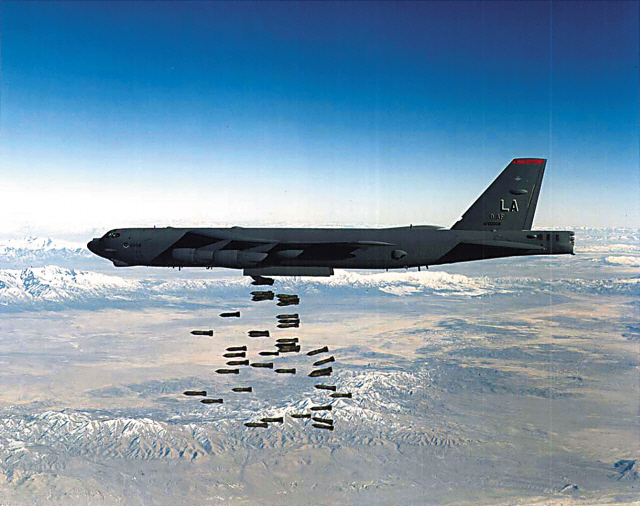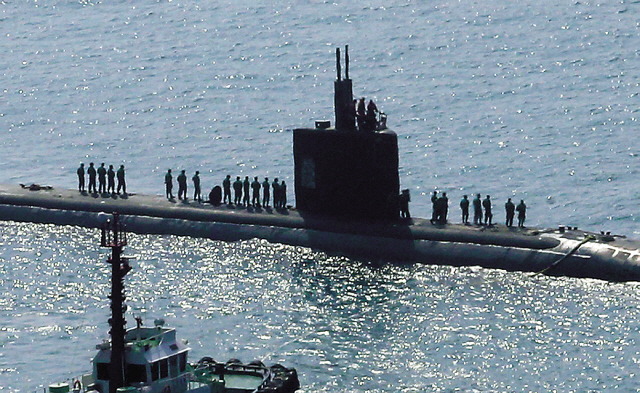Seoul divided over redeploying nukes
N.K. belligerence sparks debate about returning U.S. tactical nuclear weapons to peninsula
By Korea HeraldPublished : March 31, 2013 - 20:26
North Korea’s Feb. 12 nuclear test and continued military threats have sparked calls for Seoul to take a tougher stance against the secluded regime including enhanced nuclear deterrence.
One of the most controversial issues is conservatives’ renewed proposal to redeploy tactical nuclear weapons to South Korea.
Unlike strategic nuclear weapons that are designed to act as deterrence to war or to damage the opponent’s war capabilities, tactical nuclear weapons are built for use on a battlefield.
One of the most controversial issues is conservatives’ renewed proposal to redeploy tactical nuclear weapons to South Korea.
Unlike strategic nuclear weapons that are designed to act as deterrence to war or to damage the opponent’s war capabilities, tactical nuclear weapons are built for use on a battlefield.

The U.S. withdrew tactical nuclear weapons from its air base in Gunsan, North Jeolla Province, in 1991, the year Seoul and Pyongyang issued the Joint Declaration on the Denuclearization of the Korean Peninsula.
North Korea, however, has deviated from inter-Korean and international agreements, forging ahead with its nuclear and long-range missile programs.
Since withdrawing from the Nuclear Non-Proliferation Treaty in 2003, North Korea has been investing significant resources into developing nuclear weapons and intercontinental ballistic missile technologies.
Seoul estimates that North Korea has injected between $2.8 billion and $3.2 billion into its missile and nuclear programs over the years.

In comparison, North Korea’s impoverished economy managed to generate a gross domestic product of an estimated $32.7 billion in 2011. In the same year, the figure for South Korea came in at over $1 trillion.
According to South Korean government officials, the funds could have purchased enough corn to supply the entire population of North Korea for up to 36 months.
As a result of directing much-needed resources to an internationally condemned project, Pyongyang declared itself a nuclear-armed state in 2005.
North Korea conducted its first nuclear test the following year, and another in 2009. In the periods between the three nuclear tests, Pyongyang has also fired a number of long-range rockets. While North Korea has claimed the rockets to be satellite launch vehicles and other non-military devices, Seoul and its allies have condemned the launches as being part of an intercontinental ballistic missile development program.
Among the proponents of redeploying tactical nuclear weapons, Rep. Chung Mong-joon of the ruling Saenuri Party has been one of the most vocal.
Chung, a former chairman of the Grand National Party which has since renamed itself the Saenuri Party, has entertained the idea for some time, supporting it as the only way to bring about a change in the way North Korea deals with Seoul.
In the run up to the Saenuri Party primaries for last year’s presidential election, Chung stressed that securing the ability to retaliate in kind to Pyongyang’s nuclear threat was the only way to change North Korea’s perception of the South at a time when “North Korea neither fears nor respects South Korea.”
Chung is not alone in supporting the idea.
“The joint declaration of denuclearization was a North Korean trick. The useless joint declaration needs to be abolished to enable the redeployment of U.S. nuclear weapons (to South Korea),” Song Dae-sung, president of the national security think-tank Sejong Institute, said at a forum held in Seoul earlier this month.
“If North Korea becomes a nuclear state, South Korea can only survive by becoming a nuclear state.”
Going on to say that Seoul needed to develop its own nuclear weapons while remaining under the U.S.’ nuclear umbrella, Song dismissed concerns that such a development would lead to South Korea becoming isolated in the international community as being based on a “lack of understanding of the gravity of North Korea having nuclear weapons.”
The call for redeployment of tactical nuclear weapons, championed by the former leader of the conservatives, has been met with strong criticism from the opposition parties who have branded the idea a “dangerous gamble” and an act that would only escalate tension in the region.
Experts also point out that the U.S.’ decision to withdraw tactical nuclear weapons from its base in South Korea is likely to have been motivated by more than the denuclearization drive.
According to professor Moon Chung-in of Yonsei University, the U.S. deemed the costs associated with maintaining such devices in South Korea to outweigh the benefits.
In a recent interview with the local media, Moon said that the U.S. was highly unlikely to redeploy tactical nuclear weapons in South Korea due to President Barack Obama’s anti-nuclear policies.
Moon also pointed out that Seoul developing its own nuclear capabilities would not only be met with disapproval from the international community but also incite a nuclear arms race among northeast Asian nations.
According to reports, a high-level government official reported to the parliamentary Intelligence Committee that South Korea was capable of developing nuclear weapons within six months using existing technologies.
By Choi He-suk (cheesuk@heraldcorp.com)
-
Articles by Korea Herald



















